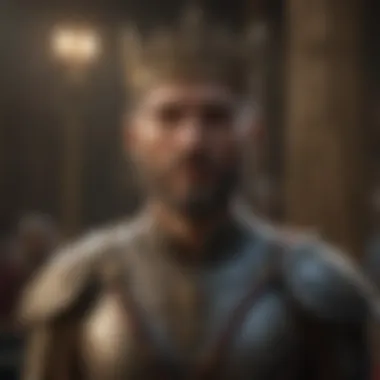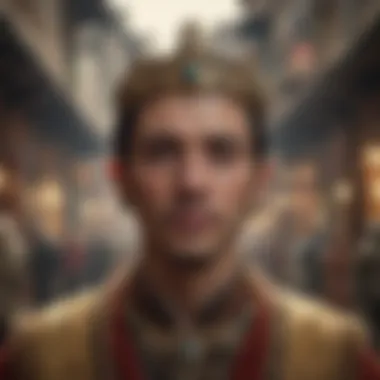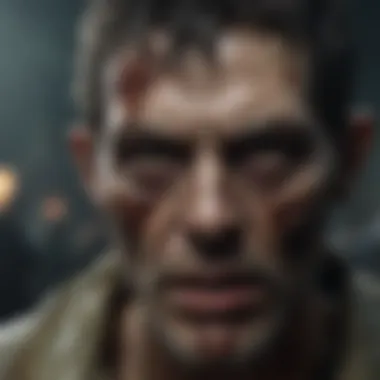Exploring The Kingdom: A Deep Dive into Netflix's Hit


Intro
The surge of interest in international television series has introduced audiences to the unique storytelling styles and themes present in various cultures. One significant addition to this conversation is The Kingdom, a South Korean series that has become a hallmark for Netflix. This show artfully intertwines the zombie genre with historical drama, exploring themes of power, survival, and societal collapse.
Overview of the Entertainment, TV Show, or Film discussed
The Kingdom is set in Korea’s late Joseon period, a time marked by political intrigue and societal upheaval. The narrative begins with the sudden outbreak of a mysterious plague that resurrects the dead, forcing a young crown prince, Lee Chang, to confront both the undead and corrupt officials. This series highlights the tensions both within the royal family and among the populace.
The show's creators, Kim Seong-hun and Kim Eun-hee, have crafted a compelling world where horror blends seamlessly with drama. The main cast includes Ju Ji-hoon, Bae Doona, and Kim Sung-kyu, who deliver powerful performances that elevate the material.
Analysis and Critique
In evaluating The Kingdom, it becomes apparent that the series excels in various aspects. The direction by Kim Seong-hun is deft; he utilizes pacing to build horror without relying excessively on jump scares. The writing is nuanced, capturing the complexity of its characters amid a world of chaos.
A notable theme throughout the series is the examination of leadership and loyalty, presented against the backdrop of a zombie apocalypse. This framing invites viewers to reflect on contemporary societal issues, making the narrative both relevant and engaging.
Comparative analysis reveals that while many shows in the horror genre rely heavily on gore, The Kingdom emphasizes psychological tension and character development, drawing comparisons to The Walking Dead, albeit with a distinct historical twist.
Episode/Scene Breakdown
Each episode of The Kingdom packs significant narrative weight, particularly the first few episodes where the tone is established. For instance, the standout scene where the prince first encounters the undead is pivotal—it sets the ominous atmosphere and underscores the urgency of the narrative. Here, the visual style accentuates the tension, employing dark lighting and sound design to great effect.
Character arcs are carefully constructed, showcasing Lee Chang's evolution from a passive prince to a decisive leader. There are stark moments of reckoning that showcase moral dilemmas, particularly in episodes where leaders must choose between self-preservation and responsibility to their people.
Audience Reception and Ratings
Upon release, The Kingdom garnered significant acclaim both critically and from audiences. It holds a high rating on platforms like Rotten Tomatoes and IMDB, where viewers express appreciation for its storytelling and production quality. The reception on social media platforms, including Reddit, has been overwhelmingly positive as fans discuss plot intricacies and character motivations.
The show's ability to blend genres has led it to not just qualify as a horror series but also a commentary on historical narratives in Korea. This multifaceted approach is reflected in viewer ratings, highlighting its broad appeal to both genre enthusiasts and drama fans.
Recommendations and Finale
For viewers intrigued by layered narratives and rich historical contexts, The Kingdom stands out as a must-watch. It is recommended for fans of horror and drama alike, as well as those seeking to explore the cultural nuances of South Korea through its entertainment.
Intro
The exploration of visual narratives has gained remarkable importance in recent years. Particularly, The Kingdom stands out not only as a significant addition to the zombie genre but also as a critical lens focusing on historical themes and societal issues. This section addresses why The Kingdom holds a unique position amidst the vast array of streaming content available today. The analysis dives into the narrative structures, character developments, and cultural reflections that enhance the viewer's understanding of both the series and the genre as a whole.
Overview of The Kingdom


The Kingdom is a South Korean television series that merges historical drama with the horror of the zombie apocalypse. Set in Korea's Joseon period, the series paints a bleak yet captivating picture of a nation grappling with both societal decay and the rise of the undead. Created by Kim Sung-hun, the series offers a rich tableau for examination in terms of its storytelling, visual techniques, and cultural implications. Each episode builds on complex political intrigues, survival instincts, and the moral dilemmas faced by characters in their quest for safety. As a period drama, it diverges from typical contemporary settings found in many zombie series, presenting viewers with a fresh perspective on familiar tropes.
Significance of the Series in the Streaming Era
With the growth of streaming services, The Kingdom emerges as a notable example of how globalized content can resonate widely, transcending linguistic and cultural barriers. Its success on Netflix demonstrates the increasing demand for diverse narratives and representation within mainstream media. The series articulates themes that are universally relatable, such as power struggles, resilience, and the fragility of human life, making it appealing to audiences worldwide. Furthermore, the production quality and attention to detail reflect a shift in how non-Western narratives can dominate and innovate within the global entertainment landscape. Viewers not only enjoy the suspense and horror but also engage in a deeper discourse about history, society, and morality.
"The Kingdom not only entertains but also invites questions about governance, ethics, and survival in extreme circumstances."
In summary, this article approaches The Kingdom from multiple angles, revealing its significance and impact in the streaming age, while contextualizing its narrative and thematic intricacies in modern viewership dynamics.
Narrative Structure
The narrative structure of a series like The Kingdom is an essential component of its storytelling. It shapes the flow of the plot and impacts how the audience engages with the characters and thematic elements. A well-crafted narrative structure leads to a compelling experience, allowing viewers to invest emotionally and intellectually. In this analysis, we will explore the significant facets of The Kingdom's narrative structure and its overall effectiveness.
Plot Synopsis
The Kingdom unfolds in a historical setting during Korea’s Joseon period. The plot centers on a mysterious plague that reanimates the dead, threatening to devour the living. The main character, Crown Prince Lee Chang, investigates the origin of this disease amidst political intrigue and power struggles. Key figures include his loyal subordinates, the morally ambiguous characters, and various villagers caught in the crossfire. The intertwining of personal stakes with larger societal issues creates a multi-layered narrative, marking it as a standout within the genre.
Pacing and Suspense
The pacing of a series dictates its rhythm and influences viewer engagement. In The Kingdom, the writers effectively balance slower character-driven moments with rapid action sequences. This mixture keeps the audience on edge. Tension builds as mysteries unfold slowly, allowing viewers time to ponder key questions. Action sequences come with intensity, heightening suspense. The result is an unpredictable narrative that maintains interest and creates lasting impact.
Themes of Survival and Morality
Survival is a primal theme in The Kingdom. Characters face moral dilemmas that challenge their values. They must weigh personal survival against communal responsibility. Acts of betrayal contrast sharply with moments of unity and courage. This exploration of morality within a survival scenario prompts the audience to reflect on ethical choices in dire circumstances. The narrative encourages viewers to consider how far they would go to protect loved ones in the face of overwhelming odds. This nuanced treatment of themes distinguishes The Kingdom from other offerings in the zombie genre, elevating it to a thought-provoking drama.
Character Development
Character development plays a crucial role in The Kingdom, as it shapes the viewer's connection to the narrative and the unfolding drama. In any storytelling medium, character arcs can significantly impact how the audience perceives and engages with the overarching themes. For this series, the characters are not merely vehicles for the plot; they embody the moral dilemmas and survival instincts faced in a zombie apocalypse. This aspect elevates the storytelling to a level where personal growth and ethical confrontations drive the narrative forward.
Protagonists and Antagonists
The distinction between protagonists and antagonists in The Kingdom is finely drawn. Lee Chang, the series' protagonist, is a crown prince thrust into chaos as he uncovers a deadly plague that turns people into zombies. His character represents the struggle between duty to the throne and a desire for truth. On the other hand, the antagonists are multifaceted. They are not only the zombies that threaten humanity but also the corrupt political figures that enhance the show's tension. The conflict lies in how these characters navigate treachery and allegiance in a crumbling world, creating a dynamic interplay that captivates the audience.
Character Arcs
The character arcs in The Kingdom reflect various human responses to crisis. Lee Chang's journey of transformation from an indecisive figure to a determined leader encapsulates the essence of growth under pressure. Similarly, supporting characters like Seo Bi, who is a physician, embody resilience and courage as they confront both personal and communal challenges. This layering of character development offers viewers insight into the complexities of human nature facing extreme situations. Each character's arc is meticulously crafted, illustrating how their motivation, decisions, and experiences intertwine to influence the plot's progression.
Symbolism Behind Characters
The symbolism associated with characters in The Kingdom adds depth to the narrative. For instance, the zombies can be viewed as a commentary on societal decay. They represent more than just monstrous beings; they symbolize the consequences of unchecked power and moral decay within the ruling class. On a more personal level, characters like Lee Chang and Seo Bi serve as symbols of hope and perseverance. Their struggles and triumphs embody broader themes of survival, ethics, and the human condition. Such symbolism enriches the viewing experience, inviting the audience to engage with the characters on multiple levels, both literally and metaphorically.


Cinematic Techniques
Cinematic techniques play a crucial role in defining the visual and auditory experience of a television series. In the case of The Kingdom, these elements effectively elevate the storytelling, allowing viewers to engage deeply with the narrative and characters. Understanding the use of cinematography, sound design, and special effects provides clearer insights into how the series captures the essence of horror and drama.
Cinematography and Visual Style
The cinematography of The Kingdom is particularly noteworthy. The use of lighting and shadows creates a tense atmosphere that reflects the series' themes of survival and despair. Each shot is carefully crafted to evoke feelings of dread and suspense. For instance, the contrast between the bright daytime scenes and the dark, menacing nights highlights the duality of safety and danger in the world of the series.
Camera angles are also significant. Low-angle shots are employed to portray characters in positions of power, while high-angle shots can depict vulnerability. This manipulation of perspective helps shape the audience's perception of the characters and their struggles.
Additionally, the series incorporates dynamic camera movements during action sequences, adding intensity and urgency. The overall visual style supports the horror genre while maintaining a distinctly Korean artistic flair.
Sound Design and Music Score
Sound design in The Kingdom is integral to the series' emotional depth. The use of silence is just as strategic as sound itself, often amplifying tension before a shocking moment. Ambient sounds contribute to worldbuilding, transporting the audience to a historical context rife with societal fears.
The music score complements the narrative arc perfectly. Composed of traditional Korean instruments blended with modern orchestration, the soundtrack enhances emotional resonance. It elevates suspense during critical scenes and underscores moments of character development. The careful selection of sound elements strengthens the overall immersive experience.
Special Effects and Makeup
Special effects and makeup design are particularly vital in establishing the horror components of The Kingdom. The portrayal of the zombie disease is made striking through practical effects, which lend a sense of realism. The makeup artists meticulously render the decay process and the grotesque appearance of the infected.
Moreover, physical stunts and practical effects are preferred over CGI where feasible. This choice enhances the visceral impact of the horror elements. For instance, choreography during fight scenes incorporates physically demanding movements, heightening the authenticity of action and tension.
In summary, the combination of effective cinematography, intricate sound design, and practical special effects in The Kingdom serves to captivate the audience while enriching the narrative. These cinematic techniques are not mere embellishments but fundamental in conveying the series' core themes and emotional weight.
"In horror, sound is often more important than visuals. The eerie silences, sudden bursts of noise, and music can create a more haunting atmosphere than any visual effect."
By understanding these techniques, viewers can appreciate how The Kingdom stands out in its genre and contributes to the broader landscape of contemporary Korean drama.
Cultural Context
Understanding the cultural context of The Kingdom is essential to appreciate its depth and significance. The series, set in the Joseon period, navigates complex themes through its storyline and characters. It is not merely a horror series, but also a lens into historical events and societal issues. This context provides viewers with a richer experience and understanding of the motivations behind the actions depicted on screen.
Reflection of Historical Events
The Kingdom serves as a reflection of significant historical events in South Korea. The series is rooted in an era marked by political turmoil, social upheaval, and disease. By weaving these elements into a narrative about a zombie outbreak, the show connects audiences with the past in a thought-provoking manner. The way the series portrays the strategies employed by leaders during chaotic times offers insights into historical governance. The portrayal of class struggles and the power dynamics also mirrors real historical contexts, prompting viewers to consider how similar themes might resonate in today's society. The historical underpinnings enhance the viewing experience, allowing for critical reflections on modern governance and public health crises.
Social Commentary
The social commentary present in The Kingdom is striking. It critiques societal norms and behaviors prevalent in both historical and contemporary settings. The series addresses issues such as corruption, inequality, and the impact of disease on a vulnerable population. These themes resonate significantly with today’s global audience, who can relate to issues like corruption in leadership or inadequate responses to public health emergencies. The show does not shy away from illustrating the darker facets of human nature, and in doing so, it sparks conversations around morality and ethics in dire situations. The character decisions in the face of adversity often mirror social dilemmas faced in reality, which lends the show a layer of relevance beyond mere entertainment.


Korean Identity in Global Formula
The Kingdom also presents an exploration of Korean identity within a global framework. As part of the Korean Wave, or Hallyu, the series showcases traditional Korean culture while appealing to a global audience. It blends local storytelling techniques with universal themes of survival and fear. This duality makes it successful in engaging a diverse viewership, thus reinforcing and educating viewers about Korean identity. While the show is steeped in its local culture, its themes are accessible to international audiences, allowing for broader discussions about identity, nationalism, and the globalization of media. This effective balance demonstrates how regional productions can thrive on a global platform while contributing to cultural exchange and understanding.
"The complexities of The Kingdom stretch beyond its narrative, reaching into the depths of history, society, and identity."
Reception and Impact
The reception and impact of The Kingdom reflects its significance in not only the realm of Korean drama but also within the broader context of global streaming content. Understanding this section is crucial as it encapsulates how the series resonated with critics and audiences, thus marking its importance in the landscape of contemporary television.
Critical Reception
The Kingdom was met with overwhelmingly positive reviews from critics. It holds a high rating on various platforms, which speaks to its quality. Reviewers praised the series for its unique blend of political intrigue and horror, drawing parallels with historical narratives. Critics noted that the show's intricate characters and well-crafted storylines elevated it above standard zombie fare.
In addition, the cinematography received specific commendation. Critics have highlighted how the visuals contribute to the atmosphere, enhancing the viewing experience. This blend of high production values and rich storytelling sparked discussions in media outlets and among influencers, further establishing The Kingdom as a critical success.
Audience Response
The audience response was equally favorable, with a significant following across various demographic groups. Viewers expressed appreciation for the show's thematic depth and character complexity. Many fan discussions emerged on platforms like Reddit where audiences dissect episodes and share insights. The engaging nature of the plot required viewers to think critically about the unfolding events, which created a dedicated community of fans.
Social media platforms witnessed strong engagement, as fans shared their thoughts and reactions. The emotional connection that viewers fostered with characters added to the show's popularity. This interaction not only bolstered its viewership numbers but also encouraged a sense of belonging among fans, demonstrating the series' impact beyond the screen.
Influence on the Zombie Genre
The Kingdom has significantly influenced the zombie genre, redefining its boundaries by merging traditional horror with rich historical context. While many zombie narratives focus on apocalyptic scenarios, this series integrates historical Korean elements, making it distinct.
The mix of political drama with supernatural horror created a fresh viewing experience. As a result, many upcoming productions have begun to borrow elements from The Kingdom, blurring the lines between genres. This fusion has led to a reinvigoration of interest in both the zombie genre and historical drama, inspiring creators to explore broader themes within similar narratives.
"Its combination of intrigue, horror, and moral questions sets The Kingdom apart, paving the way for future narratives."
Finale
The conclusion of this article serves to encapsulate the diverse elements explored throughout the analysis of The Kingdom. This series has not only reshaped the landscape of the zombie genre but has also provided a lens through which viewers can examine moral complexities and societal structures. The intricate plot intertwines themes of survival and the ethical dilemmas faced in dire circumstances, prompting discussions that go beyond mere entertainment.
Summary of Insights
Through a comprehensive examination of The Kingdom, several key insights emerge:
- Narrative Richness: The series skillfully weaves a complex narrative grounded in historical context, making it distinct from other entries in the genre.
- Character Development: The evolution of characters, both heroes and villains, illustrates the moral ambiguities of human nature, challenging viewers to reconsider their perceptions.
- Cultural Significance: As a reflection of Korea’s historical events and social issues, The Kingdom not only entertains but also educates, making it relevant to global audiences.
- Cinematic Techniques: The effective use of cinematography, sound design, and special effects enhances the storytelling, creating a gripping viewing experience.
The Future of The Kingdom Franchise
Looking ahead, the future of The Kingdom franchise appears promising. With its established fanbase and critical acclaim, further expansions or spin-offs seem likely. There is potential for exploring untold stories within its universe, delving into the backstories of secondary characters, or even examining the impact of the events of the series on broader communities.
Furthermore, should the franchise continue to evolve while maintaining its core thematic elements, it can lead to new explorations of morality, survival, and social critique. Audiences are eager for more content that not only frightens but also stimulates thoughtful conversation.
In summary, the conclusion emphasizes the enduring relevance of The Kingdom, highlighting both its revelatory insights and its vast potential for future storytelling.







